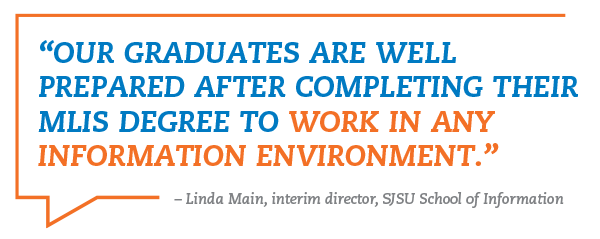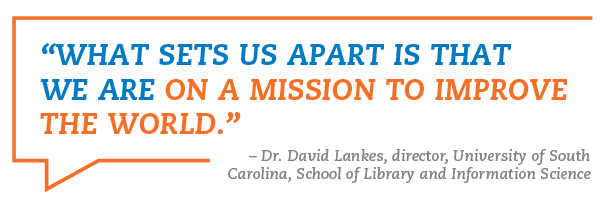MLIS NOW: Evolving to Meet Changing Needs
Earning a Master of Library and Information Studies (MLIS) degree paves the way to becoming a librarian or working in other fields that curate information. As the nature of these fields has evolved, MLIS programs have adapted to reflect these changes.


Being a librarian today is much different than just a generation ago. While the job still involves connecting stakeholders with information, how materials are stored, preserved, shared, and consumed has undergone steady transformation over the last few decades.
Consider the impact that Twitter and other social media tools have had on our public discourse. Librarians today must be well versed in finding, preserving, and disseminating both print and electronic information, which requires an extensive knowledge of websites, databases, and other technologies.
More recently, the global pandemic has challenged librarians to find new and innovative ways of connecting and serving their communities.
“The biggest challenge [for librarians] today is supporting communities reeling from the global pandemic and resulting economic strife,” says Dr. David Lankes, director of the University of South Carolina School of Library and Information Science. “Librarians, as they did after the global downturn in 2008, are providing a vital center for communities of all sorts. People are looking for comfort and guidance, but also meaning and community. A graduate degree in library and information science imparts the skills and values to help our communities rise.”
Earning a Master of Library and Information Studies (MLIS) degree paves the way to becoming a librarian or working in other fields that curate information. As the nature of these fields has evolved, MLIS programs have adapted to reflect these changes.
There are 63 ALA-accredited MLIS degree programs in the United States, and many of them offer a fully online degree. Here’s how a few of these programs have adapted to meet the changing needs of librarians today.
San Jose State University
San Jose State University School of Information’s MLIS program has been delivered exclusively online since 2009 and has about 1,800 students. Most of the course content is delivered asynchronously, giving students the freedom to access courses at their convenience.
The program offers a multifaceted, wide-ranging choice of courses that allows students to follow a variety of career pathways—academic librarianship, data science, or digital curation—or pursue a more generalized program. All students learn a set of 15 core outcomes, and they demonstrate mastery of these by building an e-portfolio.
As information management has become an increasingly technology-driven field, SJSU has continued to revise its curriculum to reflect this trend. For instance, the school added several new courses to its curriculum in fall 2020, including “Problem Solving with Data.”
“So much of the way we work with information is through technology,” says SJSU School of Information Interim Director Linda Main. “Our school does a great job of preparing people to work with information and technology effectively. We continually speak with employers and leaders in the field to ensure that our curriculum is up-to-date and is preparing graduates for the future.”
A course on Crisis/Disaster Health Informatics explores the interconnectedness of information, people, and technologies in a crisis or disaster, such as a hurricane or pandemic. Jessica Fibelstrad, a student who took the course last year, remarked how incredible it is “that so many of the events discussed [in class] are happening right now.”

An MLIS program should prepare students to work in a wide range of information environments. As SJSU’s annual “MLIS Skills at Work: A Snapshot of Job Postings” report indicates, MLIS degree holders can have many different job titles and work in several different settings. Specifically, the 2020 report found that demand is especially high in the legal and health fields.
“We are finding more and more that the job opportunities available to MLIS graduates are highly varied,” Main says. “With 14 career pathways to choose from and extensive career development resources, our graduates are well prepared after completing their MLIS degree to work in any information environment—whether that’s in a library or other information setting.”
SJSU’s most recent “MLIS Skills at Work” report also revealed that, as libraries and academic institutions have shifted to providing remote services during the pandemic, there is a need for librarians to have expertise in online instruction and instructional design. SJSU’s MLIS program aptly prepares graduates for this new reality as well.
“Students benefit from a sophisticated online learning environment, where we incorporate the latest technology to enrich the learning experience,” Main observes. “They interact with peers and instructors through web conferencing, social networking platforms, a web-based learning management system, and instant messaging. They learn advanced tools by using them every day.”
Another feature that sets the program apart is its extensive support system for students. All new students must take a course that introduces them to the technologies they’ll be using for their courses, and students also receive an advising toolkit, a success planner, and other tools to guide them. These supports are one reason the program has been recognized by the Online Learning Consortium as the most outstanding online program in any discipline.
Learn more at: https://ischool.sjsu.edu
University of South Carolina
 The University of South Carolina School of Library and Information Science’s MLIS program is also fully online and serves about 350 students. Enrolling in the program means joining “a community of students, faculty, staff, alumni, and partners that are an active part of transforming libraries into places of social impact,” says Lankes.
The University of South Carolina School of Library and Information Science’s MLIS program is also fully online and serves about 350 students. Enrolling in the program means joining “a community of students, faculty, staff, alumni, and partners that are an active part of transforming libraries into places of social impact,” says Lankes.
(Image # 3 – Girl with glasses. Upload on right side of above paragraph at 300 px)
Students are able to pursue their MLIS and a certificate of specialization with no additional cost or classes. The first of these specializations is in Equity, Diversity, and Inclusion, which is timely in today’s landscape. As the pandemic and the social unrest in the wake of the deaths of George Floyd and others has revealed, there are important equity challenges that must be resolved throughout the United States—and libraries play a central role in addressing these challenges in their communities.
Students take a core of six classes (18 hours) on basic library and information science principles and fulfill a technology competency requirement. The remainder of their degree—at least 18 hours—is tailored to their interests.
Participants in the program also build an electronic portfolio that includes a resume, vision statement, and work samples that express expertise in the program’s six competency areas: information and its organization, provision of information services, leadership and management, research, technology, and professional development and lifelong learning.

While technology is interwoven throughout the program, and participants learn key technology skills that are fundamental in today’s information environments, there is also a strong emphasis on the human and interpersonal skills that librarians need to become change agents in their communities.
He adds: “What sets us apart is that we are on a mission to improve the world—and we see students as partners in that process. We are grounded in the values of librarianship, teach the skills [required] today, and always seek to invent the future. Nothing makes us happier than when one of our graduates is recognized for leadership and improving a community.”
Learn more at: https://sc.edu
Today’s MLIS programs prepare students to work in a wide range of information environments. Technology is a key component in both the curriculum and the delivery of instruction. Reflecting current realities, today’s programs also teach participants how to build a sense of community both in person and online.
After all, the job of a librarian is about more than connecting people with information. It’s about connecting people with each other as well.
SPONSORED CONTENT
RELATED
ALREADY A SUBSCRIBER? LOG IN
We are currently offering this content for free. Sign up now to activate your personal profile, where you can save articles for future viewing









Add Comment :-
Comment Policy:
Comment should not be empty !!!